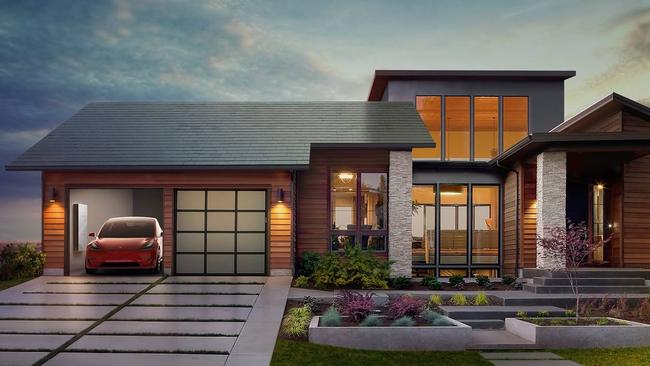Elon Musk lays out plan for Tesla union with SolarCity
Elon Musk lays out a vision of how his proposed merger of Tesla Motors and SolarCity would work.

Elon Musk wants to make solar roof panels as sexy as his electric luxury cars.
Mr Musk, chairman of both Tesla Motors and SolarCity, laid out in broad strokes his vision for how his proposed merger of the two companies would result in an integrated system of solar panels, wall-mounted batteries and electric cars.
“People always think of Tesla as an electric car company, but really the whole point of Tesla was to accelerate the advent of sustainable energy,” Mr Musk said on a stage at Universal Studios in Los Angeles surrounded by houses outfitted with glass solar tiles roughly the size and shape of roofing shingles.
“The goal is … to make solar roofs that look better than a normal roof, generate electricity, last longer, have better insulation and an installed cost that is less than a normal roof plus the cost of electricity.”
The audience greeted his words with cheers of encouragement, including an attendee who yelled, “save us, Elon”.
Consumers equipped with the products of the combined companies could generate enough clean energy to help reduce global greenhouse gases, he said, and score points with neighbours.
“The key is really to make solar something desirable where if you install a solar roof on your house, you’re really proud, you want to put it on the most prominent part of the house, you want to call your neighbours over and say, ‘check out the sweet roof’,” Mr Musk said.
The new product comes as Mr Musk works to persuade shareholders to approve Tesla’s proposed $US2.2 billion ($2.9bn) acquisition of SolarCity.
He is expected to disclose his expectations for the combined company’s financials tomorrow.
Unlike conventional solar panels, in which photovoltaic cells are assembled into a rectangular glass frame that is installed onto the roof of a building, Tesla and SolarCity have developed glass roofing tiles that are embedded with the devices that convert sunlight into electricity.
SolarCity, which is the largest US home solar panel installer, would likely target the products at homeowners. Mr Musk didn’t provide details as to how each company would contribute to the venture. Tesla plans to make four different glass roof tiles: an American-style textured glass tile; another that resembles a French slate roof; a third that has a smooth, contemporary look; and a Tuscan tile that resembles Italian terracotta roofing materials.
SolarCity has said it plans to start making solar products next summer at a factory in Buffalo, New York. Mr Musk didn’t say how much the solar tiles would cost. He said Tesla’s newest generation home battery, called the Powerwall 2, would cost $US5500, and could store and provide 14 kilowatt-hours of electricity, enough to power a four-bedroom home for a day. The earlier model had about half that capacity.
Tesla and SolarCity are unprofitable, and SolarCity is low on cash and in a different industry, which has led some analysts and investors to question the combination. Mr Musk, however, has pitched the merger as part of a “master plan” to build a company that makes clean transportation and energy products aimed at helping the world transition to a low-carbon economy. Shareholders on both sides of the transaction are scheduled to vote on the merger on November 17.
Tesla reported a surprise third-quarter profit last week, helped by record auto sales and efforts to make its operations more cost-effective. Mr Musk has been building a case for the merger as part of his long-term vision for Tesla. He aims to transform the 13-year-old company from a niche maker of luxury cars into a vertically integrated transportation company that helps customers generate solar power, store it and use it to fuel vehicles that eventually will drive themselves — and pay for themselves through a proprietary car-sharing network.
SolarCity, for its part, sells solar panels primarily to homeowners, although it also markets to commercial property owners. In addition to the panels, the San Mateo, California, company sells and installs batteries, made by Tesla, that connect to the panels as a way to store excess power at homes and office buildings.



To join the conversation, please log in. Don't have an account? Register
Join the conversation, you are commenting as Logout